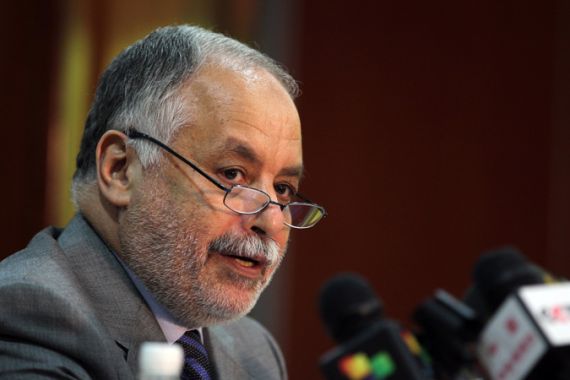Former Libyan prime minister to be tried
Al-Baghdadi al-Mahmoudi accused of crimes committed under Muammar Gadaffi, according to public prosecutor’s spokesman.

Libya’s former prime minister will be put on trial for crimes he allegedly committed during the rule of Muammar Gaddafi.
Al-Baghdadi al-Mahmoudi was extradited from Tunisia, which he fled to in September 2011 after the fall of Tripoli to rebel forces.
“Al-Baghdadi al-Mahmoudi will appear tomorrow [Monday] on the occasion of a first case” against him, Taha Baara, the public prosecutor’s spokesman, said in Tripoli on Sunday, adding that Mahmoudi faces charges of “prejudicial acts against the security of the state”.
Baara said on Sunday that al-Mahmoudi is facing charges regarding his role in a number of cases during the civil war, as well as undermining the country’s security.
Rights groups objected to his extradition on June 24, saying that he could face the death penalty and in July, Mahmoudi protested his innocence from his prison cell in the Libyan.
“I am not guilty, not guilty, not guilty,” he said during a visit to the prison organised by the authorities in an apparent bid to quash rumours he had been tortured.
“I am ready to be tried by the Libyan people. I am sure of myself and of my innocence,” he said at the time.
Along with Saif al-Islam, Gaddafi’s most prominent son, Mahmoudi is one of the few remaining keepers of the many state secrets under Gaddafi, who was killed on October 20 last year.
A physician by training, Mahmoudi was loyal to Gaddafi until the end, serving as premier from 2006 up to the final days of his regime.
Missile disposal
Elsewhere in Libya, the Libyan air force announced on Sunday that it would begin dismantling a stockpile of outdated surface-to-air missiles which had been positioned around the country by the former leader.
Military engineers have started removing potentially toxic fuel from the Russian-made weapons, which were brought to Libya from the Soviet Union in 1972.
“The air force chief of staff officially announces the beginning of a plan to remove and clean all the affected areas,” air force chief of staff, Colonel Gumma al-Abanny said.
Gaddafi scattered hundreds of SA-2 missiles across Libyan cities.
While NATO forces destroyed nearly 80 per cent of these in 2011, leakage of toxic gas from the remaining weapons is still a concern.
As well as outdated missiles, Libya’s new rulers have also been struggling to rid the streets of smaller weapons, which have been in plentiful supply since last year’s war.
In a recent drive, the government set up collection points in major cities, allowing Libyans to hand in small firearms, explosives and even rocked-propelled grenade launchers.